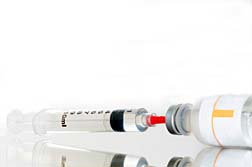We have got to get our communication house in order.
 Heparin has been in the news ad nauseum over the past year for a number of reasons, the most obvious being the discovery of a counterfeit ingredient found in raw heparin originating from China. The nation has a long history of substituting counterfeit ingredients, which mimic the real thing, in an effort to bolster volume and reduce cost, at a risk to people's health. Most recently, melamine—the same substance found in pet food 18 months ago—has turned up in children's milk indigenous to the Chinese market. Anti-freeze in toothpaste and lead in children's toys have only added to the suspicion that any consumable from the Republic of China requires thorough inspection.
Heparin has been in the news ad nauseum over the past year for a number of reasons, the most obvious being the discovery of a counterfeit ingredient found in raw heparin originating from China. The nation has a long history of substituting counterfeit ingredients, which mimic the real thing, in an effort to bolster volume and reduce cost, at a risk to people's health. Most recently, melamine—the same substance found in pet food 18 months ago—has turned up in children's milk indigenous to the Chinese market. Anti-freeze in toothpaste and lead in children's toys have only added to the suspicion that any consumable from the Republic of China requires thorough inspection.However, with heparin there have been other issues, not the least of which has been confusion with regard to the vial design for adult vs. children's heparin. Obviously, adult heparin is a much more potent formula than that which is designed to be administered to an infant. And yet the manufacturer, while affording a slightly different shade of blue for the product labels, packaged the product in similar-sized vials.
In the heat of the moment in the super-charged environment of a hospital setting it has proven too easy to mix-up the vials.
Now, it has been learned that nearly a year after heparin was recalled due to concerns, the affected heparin remained on the shelves of nearly 100 California hospitals, and at least 16 of those hospitals administered the affected product to patients long after the recall.
What it means is that the recalls aren't being properly communicated down through the system. Whether the recall notice winds up sitting on someone's desk or is duly filtered down through the proper department and then never gets enacted is unclear. However, what is clear is that—at least in this case—recalls are not being carried out, which casts doubt on the effectiveness of recalls in the first place and certainly puts the lives of patients at further risk.
According to the Associated Press, the State Board of Pharmacy inspected 533 hospitals in California. In 94 cases, recalled heparin was found on supply shelves, and at least 16 hospitals had administered the recalled heparin in patients long after the recall went out.
It has since been reported that two of the hospitals identified as administering recalled heparin to newborns was University of California San Francisco Medical Center and Children's Hospital of Central California in Madera. Both hospitals are said to be appealing the charges.
Fines for such a breach range from $2,500 to $5,000. However, that's not the point.
"This was really an alert that the recall system doesn't work," Virginia Herold, head of the State's pharmacy board, told The Associated Press.
Heparin contamination has proven a serious health issue for some and has spelled death for others. A number of heparin manufacturers, including Baxter, recalled virtually all of their heparin products after patients were found to be falling ill or even dying. Dozens of deaths have since been linked to heparin contamination.
As for container mix-ups, there, too, lies another potential source for tragedy. Heparin, a blood thinner, is often administered to premature newborns to ward against the formation of blood clots. There have been instances where adult-strength heparin was administered via syringe to an infant, with sometimes-tragic consequences. Some babies have died, and the twin newborns of actor Dennis Quaid almost did. In a highly publicized accident last November, the Quaid twins were given adult doses of heparin and fell gravely ill. Mercifully, the both recovered.
READ MORE HEPARIN LEGAL NEWS
Critics are calling for some kind of national strategy to ensure that recalls duly land in the proper hands for immediate action. As it is, drug recalls do not happen very often. When they do, it is a sign that a serious threat to human health exists, as it was with the heparin injection, and steps need to be taken to ensure that a recalled product—in this case, heparin—is stopped cold before it gets the chance to flow through a heparin syringe into someone's arm, with tragic results.
